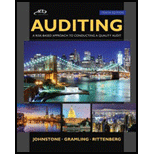
Auditing: A Risk Based-Approach to Conducting a Quality Audit
10th Edition
ISBN: 9781305080577
Author: Karla M Johnstone, Audrey A. Gramling, Larry E. Rittenberg
Publisher: South-Western College Pub
expand_more
expand_more
format_list_bulleted
Question
Chapter 1, Problem 25MCQ
To determine
Introduction:Auditor’s independence implies that auditors are required to be independent while conducting audit so that audit opinion is unbiased and is unaffected by the influence of others.
To identify:The option which is not a threat to the auditor’s independence.
Expert Solution & Answer
Trending nowThis is a popular solution!

Students have asked these similar questions
Can you explain the correct approach to solve this general accounting question?
Can you solve this general accounting problem using accurate calculation methods?
Accounting
Chapter 1 Solutions
Auditing: A Risk Based-Approach to Conducting a Quality Audit
Ch. 1 - Prob. 1TFQCh. 1 - Prob. 2TFQCh. 1 - Prob. 3TFQCh. 1 - Prob. 4TFQCh. 1 - Prob. 5TFQCh. 1 - Prob. 6TFQCh. 1 - Prob. 7TFQCh. 1 - Prob. 8TFQCh. 1 - Prob. 9TFQCh. 1 - Prob. 10TFQ
Ch. 1 - Prob. 11TFQCh. 1 - Prob. 12TFQCh. 1 - Prob. 13TFQCh. 1 - Prob. 14TFQCh. 1 - Prob. 15MCQCh. 1 - Prob. 16MCQCh. 1 - Prob. 17MCQCh. 1 - Prob. 18MCQCh. 1 - Prob. 19MCQCh. 1 - Prob. 20MCQCh. 1 - Prob. 21MCQCh. 1 - Prob. 22MCQCh. 1 - Prob. 23MCQCh. 1 - Prob. 24MCQCh. 1 - Prob. 25MCQCh. 1 - Prob. 26MCQCh. 1 - Prob. 27MCQCh. 1 - Which of the following factors is an example of a...Ch. 1 - Prob. 29RSCQCh. 1 - Prob. 30RSCQCh. 1 - Prob. 31RSCQCh. 1 - Prob. 32RSCQCh. 1 - Prob. 33RSCQCh. 1 - Prob. 34RSCQCh. 1 - Prob. 35RSCQCh. 1 - Prob. 36RSCQCh. 1 - Prob. 37RSCQCh. 1 - Prob. 38RSCQCh. 1 - Prob. 39RSCQCh. 1 - Prob. 40RSCQCh. 1 - Prob. 41RSCQCh. 1 - Prob. 42RSCQCh. 1 - Prob. 43RSCQCh. 1 - Prob. 44RSCQCh. 1 - Prob. 45RSCQCh. 1 - Prob. 46RSCQCh. 1 - Prob. 47RSCQCh. 1 - Prob. 48RSCQCh. 1 - Prob. 49RSCQCh. 1 - Prob. 50RSCQCh. 1 - Prob. 51RSCQCh. 1 - Prob. 52RSCQCh. 1 - Prob. 53RSCQCh. 1 - Prob. 54FFCh. 1 - Prob. 55FFCh. 1 - Enron and Arthur Andersen UP Enron was an energy...
Knowledge Booster
Similar questions
- Please provide the correct answer to this financial accounting problem using valid calculations.arrow_forwardPlease provide the correct answer to this general accounting problem using accurate calculations.arrow_forwardI need help with this general accounting problem using proper accounting guidelines.arrow_forward
- I need the correct answer to this general accounting problem using the standard accounting approach.arrow_forwardPlease provide the solution to this financial accounting question with accurate financial calculations.arrow_forwardCan you solve this general accounting problem with appropriate steps and explanations?arrow_forward
arrow_back_ios
SEE MORE QUESTIONS
arrow_forward_ios
Recommended textbooks for you
 Auditing: A Risk Based-Approach (MindTap Course L...AccountingISBN:9781337619455Author:Karla M Johnstone, Audrey A. Gramling, Larry E. RittenbergPublisher:Cengage Learning
Auditing: A Risk Based-Approach (MindTap Course L...AccountingISBN:9781337619455Author:Karla M Johnstone, Audrey A. Gramling, Larry E. RittenbergPublisher:Cengage Learning Auditing: A Risk Based-Approach to Conducting a Q...AccountingISBN:9781305080577Author:Karla M Johnstone, Audrey A. Gramling, Larry E. RittenbergPublisher:South-Western College PubBusiness/Professional Ethics Directors/Executives...AccountingISBN:9781337485913Author:BROOKSPublisher:Cengage
Auditing: A Risk Based-Approach to Conducting a Q...AccountingISBN:9781305080577Author:Karla M Johnstone, Audrey A. Gramling, Larry E. RittenbergPublisher:South-Western College PubBusiness/Professional Ethics Directors/Executives...AccountingISBN:9781337485913Author:BROOKSPublisher:Cengage

Auditing: A Risk Based-Approach (MindTap Course L...
Accounting
ISBN:9781337619455
Author:Karla M Johnstone, Audrey A. Gramling, Larry E. Rittenberg
Publisher:Cengage Learning

Auditing: A Risk Based-Approach to Conducting a Q...
Accounting
ISBN:9781305080577
Author:Karla M Johnstone, Audrey A. Gramling, Larry E. Rittenberg
Publisher:South-Western College Pub

Business/Professional Ethics Directors/Executives...
Accounting
ISBN:9781337485913
Author:BROOKS
Publisher:Cengage
